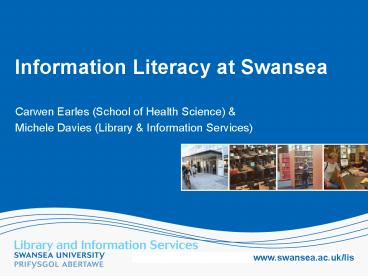Information Literacy at Swansea - PowerPoint PPT Presentation
1 / 16
Title:
Information Literacy at Swansea
Description:
Content on Blackboard as back-up online tutorials, guides, links to web resources ... Links from Blackboard website. Simulation of a virtual ward. ... – PowerPoint PPT presentation
Number of Views:33
Avg rating:3.0/5.0
Title: Information Literacy at Swansea
1
Information Literacy at Swansea
- Carwen Earles (School of Health Science)
Michele Davies (Library Information Services)
2
What is Information Literacy?
3
How it began
- Dec 2006 Director of Library Information
Services (LIS) asked the LIS Teaching Group to
write an Information Literacy strategy. - April 2007 draft strategy finished after much
consultation and participation between LIS
subject teams, Careers etc.. - June 2007 passed by the Universitys Learning
and Teaching committee as part of the L T
strategy.
4
Why Information Literacy is important to Swansea
- Equips students with the skills needed to
search, retrieve and evaluate information for
their academic work. - To support SUs Learning Teaching strategy.
- To develop research PG students.
- Aids student retention.
- To meet the requirements of educational bodies
in the UK . - To develop lifelong learning skills.
- To ensure employability in a knowledge economy.
5
Why now?
- Provision of IL has been a focus of LIS for many
years (user education or information skills) - What has changed?
- Increase in numbers of overseas students
(different educational and cultural backgrounds.) - Increase in usage of internet information the
google generation and ease of copyn paste
(plagiarism). - Complexity of range of electronic sources.
6
How do we achieve the goal of making every
student information literate?
- by making IL sessions timely and relevant.
- by embedding IL in the curriculum.
- by developing teaching skills of LIS subject
librarians. - by research
- use of online delivery to support face-to-face
sessions
7
Achieving our goals
- Were addressing the first two goals by
reviewing provision of IL in schools by meeting
with key school contacts. - Embedding IL in the curriculum
- Timeliness of provision
- Content on Blackboard as back-up online
tutorials, guides, links to web resources
8
Achieving our goals
- Developing the quality of our teaching
- by peer review
- by attendance at LILAC (WHELF sponsored places)
feedback. - by provision through the LIS staff development
programme of external input (visiting speakers).
This has boosted discussion and understanding of
issues involved.
9
Achieving our goals
- By Research
- LIS-led focus groups for researchers to assess
their needs. - By collaboration with PG Research Training
Officer over the Research Readiness
Self-Assessment tool (customization of a tool
developed by Central Michigan University)
10
Achieving our goals
- By innovation
- Use of an Audience Response System during IL
sessions. - Development of online IL support through
Blackboard (generic LIS Bite-size subject
specific provision through modules for students
and researchers). - Using Web 2.0 technologies such as blogs to
engage students through reflection.
11
What next?
- improve methods of evaluation.
- improve methods of informal and formal
assessment. - experiment with inquiry-based learning.
12
Evidence based practice in the School of Health
Science
- Evidence based practice requires that decisions
about health care are based upon the best
available current, valid and relevant evidence.
These decisions should be made by those receiving
care, informed by the tacit and explicit
knowledge of those providing care, within the
context of available resources. - Martin Dawes et al(2005).
13
Pre-registration undergraduate degree in Nursing
- Close working between the library and the
School of Health Science. - Library skills written into the curriculum are
mandatory. - Seven sessions spread over three year period
- Sessions concentrate on what knowledge is
needed, how to get the knowledge and evaluating
the knowledge for use.
14
Blackboard
- Blackboard is a virtual learning environment.
- Means of support in information literacy.
- Library links, library teaching sessions and
supporting literature can be found here. - Can be utilised through medium of Welsh or
English.
15
Example eWard
- This is an interactive multimedia learning
package. - Links from Blackboard website.
- Simulation of a virtual ward.
- Includes knowledge acquisition, evaluating
knowledge found, to ensure the development of
skills re planning care, problem solving and
clinical decision making.
16
References
- Dawes, M. et al (2005) Sicily statement on
evidence-based practice, BMC Medical Education,
5 (1). Online at http//www.biomedcentral.com/147
2-6920/5/1 - SCONUL Information Skills Task Force (1999) Seven
pillars of information literacy model, Society of
College, National University Libraries .
Online at http//www.sconul.ac.uk/groups/informat
ion_literacy/seven_pillars.html - Swansea University (2007) Information Literacy
strategy, 2007-08. Online at http//www.swan.ac.
uk/media/Media,19199,en.doc - University College London (UCL) CIBER Group
(2008) Information behaviour of the researcher of
the future, UCL. Online at http//www.jisc.ac.uk/
whatwedo/programmes/resourcediscovery/googlegen.as
px

